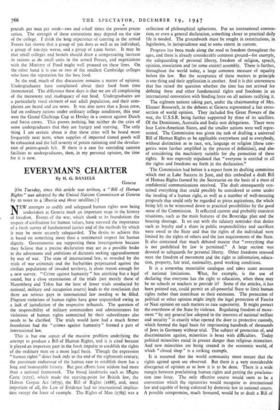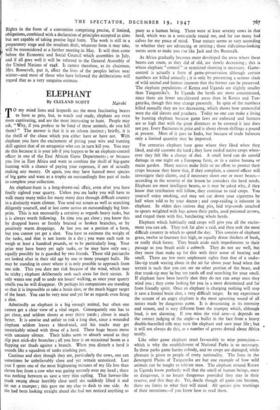EVERYMAN'S CHARTER
By H. G. DANIELS Geneva [On Tuesday, since this article was written, a " Bill of Human Rights" was adopted by the United Nations Commission at Geneva by to votes to 4 (Russia and three satellites.) NEW attempts to codify and safeguard human rights now being undertaken at Geneva mark an important stage in the history of freedom. Events of the war, which shook to its foundations the respect of civilisation for human values, have stressed the importance of a fresh survey of fundamental justice and of the methods by which it may be more securely safeguarded. The desire to achieve this is based on something more than a sentimental respect for human dignity. Governments are supporting these investigations because they believe that a precise declaration may act as a possible brake to the adventures and ambitions of dictators seeking aggrandisement by way of war. The state of international law, as revealed by the trials of war criminals and the barbarities perpetuated against the civilian populations of invaded territory, is alone reason enough for a new survey. " Crime against humanity " has anything but a legal sound, but a close examination of the trials (not merely those of Nuremberg and Tokio but the host of lesser trials conducted by national, military and occupation courts) leads to the conclusion that there are serious gaps in international law needing to be filled. Flagrant violations of human rights have gone unpunished owing to a lack of jurisdiction of the respective tribunals. The question of the responsibility of military commanders and administrators for violations of human rights committed by their subordinates also needs to be clarified. The trials would have had a much firmer foundation had the " crimes against humanity " formed a part of international law.
This is but one aspect of the massive problem underlying the attempt to produce a Bill of Human Rights, and it is cited because it played nn important part in the fresh impulse to establish the rights of the ordinary man on a more legal basis. Though the expression " human rights " dates back only to the end of the eighteenth century, the passionate endeavour of the human race to establish them has a long and honourable history. But past efforts have seldom had more than a national framework. The broad landmarks such as M'agna Carta (x215), which made the starting-point for British law, the Habeas Corpus Act (1679), the Bill of Rights (x688), and, most important of all, the Law of Evidence had no international implica- tion except the force of example. The Rights of Man (1789) was a collection of philosophical aphorisms. For an international conven-- tion, or even a general declaration, something closer to practical daily life is needed. The groundwork must be sought in constitutions, in legislation, in jurisprudence- and to some extent in custom.
Progress has been made along the road to freedom throughout the ages, and there is already considerable common ground—for example, the safeguarding of personal liberty, freedom of religion, speech, opinion, association and (to some extent) assembly. There is further, throughout the world today, a large common measure of equality before the law. &it the acceptance of these matters in principle is one thing and their application is another. And it is this unevenness-
that has raised the question whether the time has not arrived for defining these and other fundamental rights and freedoms in an international convention with binding force on all nations ratifying it.
The eighteen nations taking part, under the chairmanship of Mrs. Eleanor Roosevelt, in the debates at Geneva represented a fair cross- section of world opinion. They included five Great Powers of the war, the U.S.S.R. being further supported by three of its satellites. Of the Dominions, Australia and India sent delegations. There were four Latin-American States, and the smaller nations were well repre-.
sented. The Commission was given the task of drafting a universal Bill of Human Rights to be applicable everywhere and to everybody, without distinction as to race, sex, language or religion (these cate- gories were further amplified in the process of definition), and also of considering the machinery suitable for the protection of these rights. It was expressly stipulated that " everyone is entitled to all the rights and freedoms set forth in the declaration."
The Commission had before it a report from its drafting committee which met at Lake Success in June, and this embodied a draft Bill of Human Rights framed by the Secretariat on the basis of a mass of confidential communications received. The draft consequently con- tained everything that could possibly be considered to come under the heading of a human right, as well as a number of well-meaning proposals that could only be regarded as pious aspirations, the whole being left to be winnowed down to practical possibilities by the good sense of the Commission. It reflected current and probably transient situations, such as the main features of the Beveridge plan and the housing shortage. It set out with the salutary reminder that duties such as loyalty and a share in public responsibilities and sacrifices were owed to the State and that the rights of the individual were limited by the rights of others and the just requirements of the State.
It also contained that much debated maxim that "everything that is not prohibited by law is permitted." A large section was devoted to safeguards for personal liberty. Other freedoms stressed were the freedom of movement and the right to information, educa- tion, property, fair trial, nationality, good working conditions.
It is a somewhat materialist catalogue and takes scant account of national limitations. What, for example, is the use of declaring that everyone has the right to education, when there may be no schools or teachers to provide it? Some of the articles, it has been pointed out, could permit an all-powerful State to limit human rights rather than contribute to their extension. The protection of political or other opinion might imply the legal protection of Fascist or Nazi opinion on such matters as race superiority. It might protect the overthrow of the State by violence. Regulating freedom of move- ment " by any general law adopted in the interests of national welfare and security " is exactly what opened the door to protective custody, which formed the legal basis for imprisoning hundreds of thousands of Jews in Germany without trial. The subject of protection of, and discrimination against, minorities is beset with difficulties. Today political minorities stand in greater danger than religious minorities. And new minorities are being created in the economic world, of which " closed shop " is a striking example.
It is assumed that the world community must ensure that the rights agreed upon are observed. But there is a very considerable divergence of opinion as to how it is to be done. There is a.wide margin between proclaiming human rights and putting the proclama- tion into force. The only effective course would seem to be a convention which the signatories would recognise as international law and capable of being enforced by domestic law in national courts. A possible compromise, much favoured, would be to draft a Bill of Rights in the form of a convention comprising precise, if limited, obligations, combined with a declaration of principles accepted as aims but not capable of taking precise legal form. The work is still in a preparatory stage and the resultant draft, whatever form it may take, will be reconsidered at a further meeting in May. It will then come before the Economic and Social Council which assembles in July, and if all goes well it will be referred to the General Assembly of the United Nations of 1948: It cannot therefore, as its chairman, Mrs. Roosevelt, put it, affect the lives of the peoples before next winter—and most of those who have followed the deliberations will regard that as a very sanguine estimate.



































 Previous page
Previous page